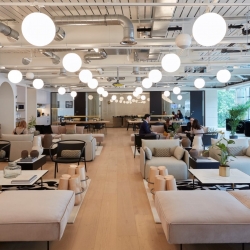June 21, 2023
Flexible office space provider LABS on why the physical office space is still strategically key
 A recent survey conducted among LABS members shows that the physical office space still has a valuable place in the mindset of how they want to work. More than seven in ten of those questioned said the office is a strategic device for their businesses, and more than 74 percent of members questioned use the office for two days or more per week.
A recent survey conducted among LABS members shows that the physical office space still has a valuable place in the mindset of how they want to work. More than seven in ten of those questioned said the office is a strategic device for their businesses, and more than 74 percent of members questioned use the office for two days or more per week.
However, working culture is still developing rapidly following the pandemic and its government-mandated full time working-from-home set up, with employers and employees carefully navigating a path that tees up with company expectations as well as staff’s desire to work remotely for part of the week, which in some cases allows them to better deal with issues such as child or elder care or just attain a better work/life balance. Companies are clearly grappling with the complexities of managing diverse teams with varying needs and preferences. The seniority of employees and their distinct working styles play a crucial role in determining the feasibility and desirability of remote work.
While the Office for National Statistics reveals that 40 percent of civil servants in the UK are still working from home there is a definite flip side in the private sector. In the spring of this year, Bloomberg reported that, following a large-scale layoff programme in the tech sector, Meta CEO Mark Zuckerberg has asked its staff to “find more opportunities to work with your colleagues in person.” This is the latest in a long line of high-profile firms to reverse their work-from-home policies including Starbucks and Walt Disney Co. Other firms in the pro-return to the office camp include Goldman Sachs, Morgan Stanley, Apple, and Peloton with the CEO of JP Morgan stating that he doesn’t believe working from home works for managers or younger members of staff. Bloomberg itself has set a minimum presence in the office of three days per week.
Amazon too has a thrice weekly attendance policy which kicked in last month in light of CEO Andy Jassy saying on the firm’s blog that “There is something about being face-to-face with somebody, looking them in the eye and seeing they’re fully immersed in whatever you’re discussing that bonds people together.” General Motors’ management shares Amazon’s three days per week requirement which came into force at the beginning of 2023, which some staff took as a U-turn in company policy from encouraging colleagues to ‘Work Appropriately’.
Making the office the destination of choice
As well as incentives such as free food and drinks, access to facilities including gyms and opportunities to come together at work socials, the chairman of PwC believes that AI has its part to play in luring people from their home offices. The Times recently reported that Kevin Ellis thinks that as people feel pressure from the capabilities of the likes of Chat GPT, they are more likely to want to be in the office near colleagues they can collaborate and learn from.
In a company-wide presentation, the professional services giant explained to staff how AI has the potential to fast-track trainees by a couple of years but with that accelerated knowledge base comes a responsibility to be able to coach and manage others that traditionally would have taken place over a longer period. Ellis said at the time that “people are going to want to learn from others face-to-face and the best way a human can differentiate themselves from a robot is in person.”
It’s fair to say then that the mood may well be shifting from the ‘work from anywhere’ easy come easy go attitudes of 2021 and last year. As companies continue to navigate the choppy waters of political unease in Ukraine, the continuing impact of Brexit and the worldwide inflation rates not to mention the global cost of living crisis so they are increasingly calling for near full-time attendance, symbolising a return to pre-pandemic norms, to stay competitive.
Being present in the office has many well-documented advantages such as fostering creativity, encouraging and engendering a sense of culture. And there are positive signs among LABS members too, with over three quarters of them enjoying working from the office most of the time with over half citing colleague relationships as the most important aspect of an office, up by 4 percent year on year.
Given the aforementioned global political uncertainty and economic strife, flexibility and choice for occupiers as well as employees are key components of our current work culture. In this way, workplace strategies can easily shift to address sudden changes. Which is where LABS’ turnkey solutions, available in various shapes and sizes, come in with flexible tenancy arrangements and inspiring amenities. In this way LABS can help optimise a workplace model that works for everyone.

Matt Watts is the Managing Director at LABS















